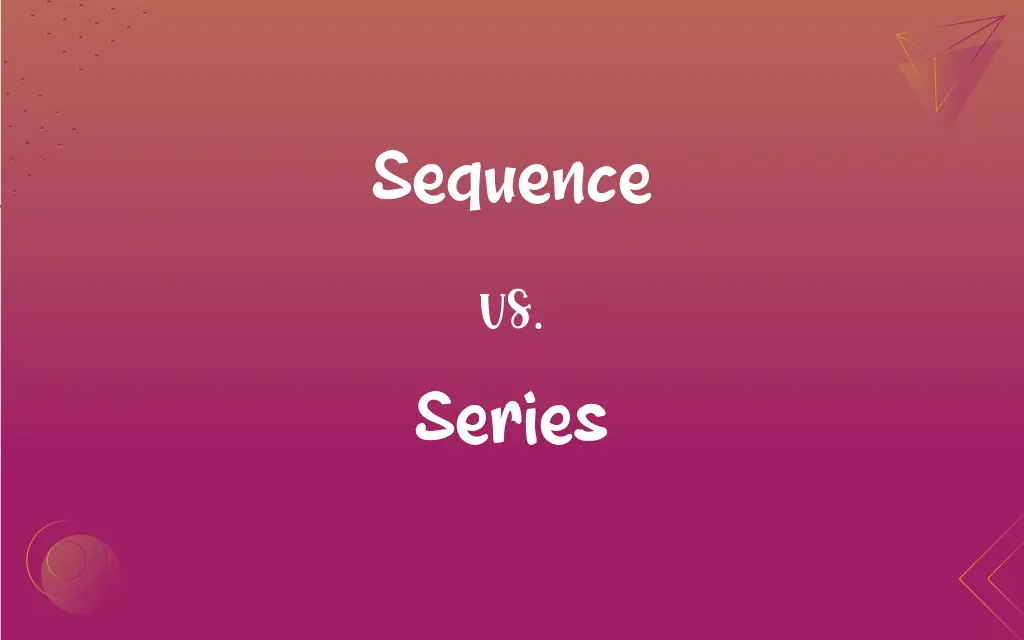Sequence vs. Series: What's the Difference?
Edited by Janet White || By Harlon Moss || Published on November 11, 2023
A sequence is an ordered list of elements, while a series is the sum of terms in a sequence.

Key Differences
A sequence refers to a list of numbers or elements arranged in a specific order. In contrast, a series pertains to the sum of the numbers or terms from a sequence.
In mathematical contexts, a sequence can be finite or infinite, presenting numbers in a definite pattern. A series, however, adds these numbers together, either to a finite sum or towards infinity.
Sequences primarily concern the order and arrangement of items. Series, on the other hand, concern the aggregation or accumulation of these items.
Understanding a sequence means recognizing the pattern or progression of its terms. To understand a series, one must consider the cumulative total of the terms from a sequence.
A sequence can be visualized as a list of terms. A series, in contrast, would be visualized as the result of adding these terms together.
ADVERTISEMENT
Comparison Chart
Definition
Ordered list of elements
Sum of terms in a sequence
Concern
Order and arrangement
Aggregation or accumulation
Visualization
List of terms
Result of adding terms together
Mathematical Aspect
Can be finite or infinite
Summation, finite or towards infinity
Relation
Provides the terms
Provides the cumulative total of terms
ADVERTISEMENT
Sequence and Series Definitions
Sequence
A chronological order of actions.
He followed a sequence of steps to complete the task.
Series
A set of related things coming one after another.
She watched a series of documentaries on nature.
Sequence
An ordered arrangement of items.
The sequence of events was confusing to the audience.
Series
The sum of the terms of a sequence.
The series of the first four positive integers is 10.
Sequence
A set of numbers following a pattern.
The sequence 2, 4, 6, 8 demonstrates an even pattern.
Series
A number of events of a similar kind.
The team won a series of matches this season.
Sequence
A specific order in which related things follow each other.
The sequence of chapters in the book was well-structured.
Series
A group of related items presented as a continuous string.
The concert consisted of a series of musical performances.
Sequence
A succession of related elements.
The DNA sequence is vital for genetic studies.
Series
A set of books or shows with a common theme or character.
The detective series became immensely popular.
Sequence
A following of one thing after another; succession.
Series
A number of objects or events arranged or coming one after the other in succession.
Series
A set of stamps, coins, or currency issued in a particular period.
FAQs
Does a series always represent addition of terms?
In mathematics, a series typically refers to the summation of sequence terms.
What is a series?
A series is the sum of terms from a sequence.
Can a series be visualized?
Yes, a series can be visualized as the result of adding sequence terms together.
What's the key difference between sequence and series?
A sequence refers to order and arrangement, while a series pertains to accumulation or sum.
Can a sequence be infinite?
Yes, a sequence can be finite or infinite.
Do series always have a finite sum?
No, some series converge towards infinity and don't have a finite sum.
Is every series derived from a sequence?
Yes, a series represents the sum of terms from a sequence.
Can both words, sequence and series, be used outside mathematics?
Yes, both terms can be used in general contexts, like a sequence of events or a TV series.
How is a sequence different from a set?
A sequence has a specific order, while a set doesn't emphasize order.
Can a book or a show be called a series?
Yes, a group of related books or shows can be termed a series.
What is a sequence?
A sequence is an ordered list or arrangement of elements.
Is every sequence summable to a series?
Not every sequence has a convergent series, especially if it's infinite and doesn't approach a limit.
Can sequences represent patterns?
Yes, sequences often represent specific patterns or progressions of terms.
Can both sequence and series be used in arts and music?
Yes, they can represent order and arrangement or a collection of related works.
Does a sequence always have a discernible pattern?
Not necessarily; while many sequences follow patterns, some may not have an easily discernible one.
How is the sum of a sequence determined?
The sum is determined by adding the terms of the sequence, resulting in a series.
Are both sequence and series important in math?
Yes, both are foundational concepts in various mathematical studies.
Can sequences be non-numeric?
Yes, sequences can be of actions, events, or any ordered set of elements.
Is a series always derived from a sequence in everyday language?
No, in everyday language, "series" can mean a set of related events or things without reference to a sequence.
Can the terms "sequence" and "series" be used interchangeably?
While related, they have distinct meanings and are not typically interchangeable.
About Author
Written by
Harlon MossHarlon is a seasoned quality moderator and accomplished content writer for Difference Wiki. An alumnus of the prestigious University of California, he earned his degree in Computer Science. Leveraging his academic background, Harlon brings a meticulous and informed perspective to his work, ensuring content accuracy and excellence.
Edited by
Janet WhiteJanet White has been an esteemed writer and blogger for Difference Wiki. Holding a Master's degree in Science and Medical Journalism from the prestigious Boston University, she has consistently demonstrated her expertise and passion for her field. When she's not immersed in her work, Janet relishes her time exercising, delving into a good book, and cherishing moments with friends and family.







































































